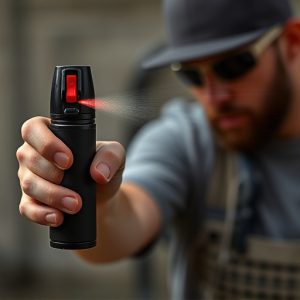Inflammatory Sprays for Civilian Protection: Safety, Decontamination & Legal Guidelines
Pepper spray, a popular civilian self-defense tool, can cause severe skin irritation due to its caps…….
Pepper spray, a popular civilian self-defense tool, can cause severe skin irritation due to its capsaicin content. Prompt decontamination with soap and water is crucial to prevent redness, burning, blisters, and chemical burns. Wearing protective gear and rinsing exposed skin for 15 minutes or more significantly reduces discomfort and infection risks. Understanding local laws regarding pepper spray usage is essential for legal compliance and personal safety. Responsible practices emphasize the need to decontaminate skin immediately after exposure to prevent cross-contamination in public spaces.
Inflammatory sprays, like pepper spray, have become common tools for civilian protection. This article delves into the effectiveness of these agents and their impact on skin. We explore how inflammatory sprays play a crucial role in safeguarding civilians, while also highlighting safety measures and decontamination techniques to protect users and bystanders alike. Additionally, we discuss legal considerations and responsible use guidelines, emphasizing the importance of understanding both the power and limitations of these protective tools. Learn how to effectively decontaminate skin from pepper spray and ensure safety in various scenarios.
- Understanding Pepper Spray and Its Impact on Skin
- The Role of Inflammatory Sprays in Civilian Protection
- Safety Measures and Effective Decontamination Techniques
- Legal Considerations and Responsible Use Guidelines
Understanding Pepper Spray and Its Impact on Skin
Pepper spray, a powerful tool for self-defense and civilian protection, is designed to disrupt an assailant’s vision and breathing momentarily. It works by irritating the eyes, nose, mouth, and skin through capsaicin, the compound found in chili peppers. This irritation causes intense pain and discomfort, allowing the user to escape or seek help. However, once pepper spray makes contact with the skin, it can be challenging to remove without proper decontaminating measures.
The impact of pepper spray on the skin can range from redness and burning sensations to more severe reactions like blisters and chemical burns. Decontaminating the skin as soon as possible is crucial to prevent these irritations from escalating. Proper decontamination involves thoroughly washing the affected areas with soap and water, ensuring that no residual pepper spray remains on the skin. This simple yet effective process helps alleviate discomfort and reduces the risk of secondary infections or further irritation.
The Role of Inflammatory Sprays in Civilian Protection
Inflammatory sprays, such as pepper spray, play a significant role in civilian protection by providing a non-lethal means of self-defense against potential threats. In public spaces, where individuals may be at risk of physical harm or assault, these sprays offer a quick and effective solution for deterring and neutralizing attackers. The primary function of inflammatory sprays is to decontaminate the skin from irritants or harmful substances, ensuring the safety and well-being of civilians.
When faced with an attack, pepper spray can quickly impair an attacker’s vision, breathing, and movement, giving the victim precious time to escape or seek help. The decontamination process involves the spray’s active ingredients temporarily irritating the eyes, nose, and respiratory system, allowing users to create distance from dangerous situations. This simple yet powerful tool empowers civilians by providing them with a sense of security and control in potentially high-risk environments.
Safety Measures and Effective Decontamination Techniques
When using inflammatory spray for civilian protection, safety measures are paramount. Always wear protective gear, including gloves and eye protection, to minimize direct contact with the spray. In case of exposure, promptly decontaminate the skin from pepper spray by rinsing the affected area with copious amounts of water for at least 15 minutes. This initial rinse helps to dilute the spray’s active ingredients and alleviate discomfort.
For more effective decontamination, consider using a mild soap solution or over-the-counter eye wash. Rubbing the skin gently while rinsing can aid in removing any residual spray. It’s crucial to avoid touching the eyes, nose, and mouth until thoroughly washed, as these areas are particularly sensitive. Additionally, ensure proper ventilation during decontamination to prevent inhalation of pepper spray particles.
Legal Considerations and Responsible Use Guidelines
When considering the civilian use of inflammatory spray for personal protection, it’s crucial to understand the legal landscape surrounding its deployment and responsible usage. Each jurisdiction has specific laws governing the possession, carrying, and application of pepper spray or other similar self-defense products. Before utilizing such a device, individuals should familiarize themselves with local regulations, ensuring they are permitted to carry and use these items for personal safety without infringing upon any legal boundaries.
Responsible use guidelines emphasize the importance of decontaminating skin from pepper spray after each encounter. Users must be mindful of potential cross-contamination, especially in public spaces. This involves promptly rinsing affected areas with ample water and seeking medical attention if irritation persists or symptoms escalate. Following these practices helps maintain a safe environment for both individuals involved and the wider community while ensuring the effective and responsible use of inflammatory spray.
Inflammatory sprays, like pepper spray, play a significant role in civilian protection, but their usage necessitates a thorough understanding of safety measures and legal guidelines. By learning effective decontamination techniques to cleanse the skin after exposure, individuals can mitigate the impact of these agents. Responsible use, combined with proper training and knowledge, ensures that citizens are empowered while upholding legal considerations, making them an essential tool for personal protection in various scenarios.


